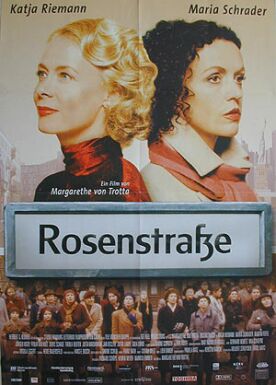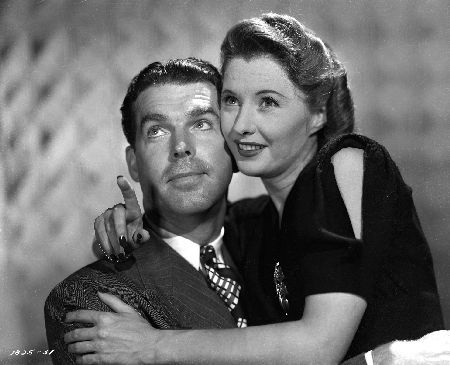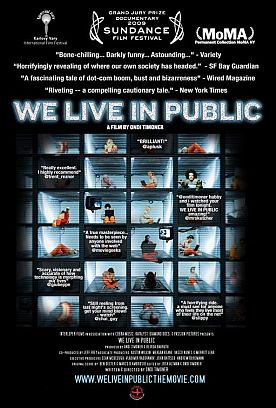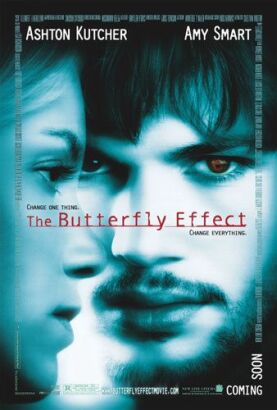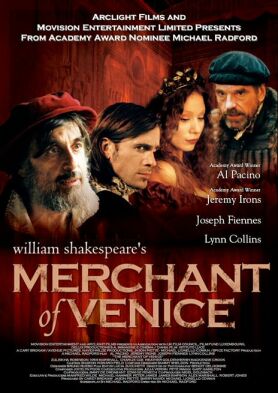Rosenstrasse
You wouldn’t think that there would be a huge potential market for movies about morally conflicted Nazis. Nazis are too useful to us as they are — that is, as movie shorthand for pure evil. Giving them even a vestigial conscience about what they are doing could be seen as undermining the very foundations of the post-war cinema. Margarethe von Trotta gets round this problem in an interesting way. Her Rosenstrasse tells the true story of some brave German women of non-Jewish descent who dared to demonstrate on behalf of their Jewish husbands. The men were being held in a former Jewish community center, on the street in Berlin named in the title, preparatory to being deported to the death camps of the East. Their wives stood outside in the Rosenstrasse in all weathers, daring the guards to shoot them, and finally forced the authorities to back down and let the men go.
Ms von Trotta sees and tries to capture the irony of the fact that the women are able to stand up to the Nazis only by virtue of their appeal to the cardinal National Socialist virtue of loyalty. How could even Nazis shoot women for standing by their husbands at the risk of their own lives? She also adds a nice touch by cutting away from the demonstration to a party at which a personal appeal is to be made by Lena Fischer (Katja Riemann), one of the more aristocratic wives and the daughter of a general, to Goebbels (Martin Wuttke) himself. As it happens, Goebbels is being particularly charmed at this party by Lizzy (Nina Kunzendorf), a popular chanteuse, who sings a flirtatious song as if it were especially for him about how it is for her “a shame to love one man only,” for “how can such dazzling beauty be one man’s reward?”
The song is really a throwback to the sexually licentious and self-consciously naughty pre-war era that Hitler and Company were supposed to have swept away when they came to power. In a way it was if the unexpected monument to monogamy in the Rosenstrasse were a reproach to the Nazis for not living up to their own ideals. Well, if the devil can quote scripture to his own purpose, a turnabout is fair play. But the irony gets a bit lost, I think, in the movie’s complicated and not quite comprehensible framing story, which is set in the present day.
An 8-year-old girl called Ruth (Svea Lohde) is a daughter of the opposite sort of union, a Jewish mother and gentile father. When her mother is arrested, her father deserts her. She is taken under the wing of Lena, who passes her off as an Aryan child, thus saving her life. The film begins and ends in present-day New York with the death of the husband of the now-60-something Ruth (Jutta Lampe). Her daughter, Hannah (Maria Schrader), only begins to learn about her mother’s history after her father’s death and returns to Berlin to meet the now-aged Lena (Doris Schade) for the fuller account of it that her mother herself is unwilling to give. Why is her mother so unwilling to discuss this history? Why is she apparently hostile to the woman who saved her life? Why after a lifetime as a secular Jew is she suddenly turning religious and threatening to disown Hannah if she marries her Nicaraguan boyfriend, Luis (Fedja Van HuLt)? And what does the death of Hannah’s father, Ruth’s husband, have to do with it all?
Not only are the film’s answers to these questions, such as they are, unpersuasive, but we wonder why they have been raised in the first place. They only distract us from the life-and-death drama of 1943 by superimposing on it a present-day soap opera of little intrinsic interest. It may be that the former is meant to put the latter in perspective, but the foregrounding of the contemporary material seems to me to have the opposite — surely unwanted? — effect of making the heroism of the women of the Rosenstrasse seem more remote. Or is the older Ruth’s re-discovery of her Jewishness meant to be a belated affirmation of the loyalty of the demonstrators?
If so, it didn’t come across for me. But for the pleasure of looking at Miss Schrader, I would have been happy to have the whole of the confusing, present-day story swept away in favor of a straightforward account of the Rosenstrasse. Of course, one thing that might have justified such an extended junket into the present would have been a contrast not only with the lax morals and the threat to marriage in the 1930s but with the lax morals and the threat to marriage today. But Ms von Trotta doesn’t seem to want to go there for some reason. It’s easier to treat the women of the Rosenstrasse, like the other icons of our recent “greatest generation” idolatry, as uniquely brave and noble and thus far beyond any capacity of our own for emulation of them. We are safe from the demands of heroism so long as they remain on their pedestals.
Discover more from James Bowman
Subscribe to get the latest posts to your email.

